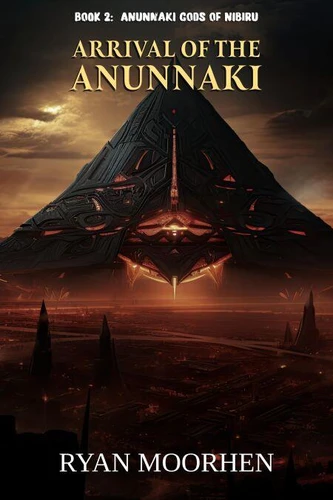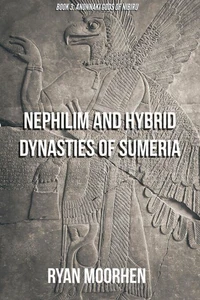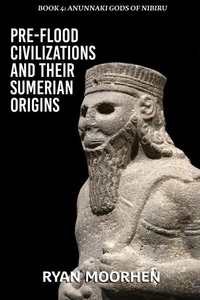Arrival of the Anunnaki. Anunnaki Gods of Nibiru, #2
Par :Nouveauté
Formats :
Disponible dans votre compte client Decitre ou Furet du Nord dès validation de votre commande. Le format ePub est :
- Compatible avec une lecture sur My Vivlio (smartphone, tablette, ordinateur)
- Compatible avec une lecture sur liseuses Vivlio
- Pour les liseuses autres que Vivlio, vous devez utiliser le logiciel Adobe Digital Edition. Non compatible avec la lecture sur les liseuses Kindle, Remarkable et Sony
 , qui est-ce ?
, qui est-ce ?Notre partenaire de plateforme de lecture numérique où vous retrouverez l'ensemble de vos ebooks gratuitement
Pour en savoir plus sur nos ebooks, consultez notre aide en ligne ici
- FormatePub
- ISBN8231816347
- EAN9798231816347
- Date de parution29/08/2025
- Protection num.pas de protection
- Infos supplémentairesepub
- ÉditeurWalzone Press
Résumé
From the ruins of Sumer and Babylon to the echoes of Egypt, India, and Mesoamerica, ancient civilizations left behind more than broken temples and forgotten tablets-they left a memory of gods who descended from the stars. Known as the Anunnaki, these lords of heaven and earth appear in hymns, myths, and king lists not as distant abstractions, but as radiant beings who walked among mortals, founded cities, bestowed kingship, and shaped the destiny of humanity.
Their descent was not fleeting-it was the catalyst for civilization itself. Arrival of the Anunnaki takes readers deep into Mesopotamian lore, exploring the fiery chariots, winged discs, and cosmic councils that defined the world's earliest myths. From Eridu, the first city where kingship was "lowered from heaven, " to the enigmatic star Nibiru-the supposed homeworld of the gods-this book traces the story of descent, transformation, and memory.
It uncovers how these myths of star-born rulers resonate across cultures: the divine kings of Egypt's Zep Tepi, the vimana-riding devas of India, and the radiant Feathered Serpents of Mesoamerica. Blending archaeology, mythology, and the controversial legacy of thinkers like Zecharia Sitchin and Erich von Däniken, this book examines how the Anunnaki became both the architects of ancient cities and the cornerstone of modern debates about humanity's origins.
Were they gods, archetypes, or visitors from beyond? Arrival of the Anunnaki does not claim to settle the question-it reveals how the memory of their descent continues to shape religion, history, and imagination, from the first ziggurats to today's search for our place among the stars.
Their descent was not fleeting-it was the catalyst for civilization itself. Arrival of the Anunnaki takes readers deep into Mesopotamian lore, exploring the fiery chariots, winged discs, and cosmic councils that defined the world's earliest myths. From Eridu, the first city where kingship was "lowered from heaven, " to the enigmatic star Nibiru-the supposed homeworld of the gods-this book traces the story of descent, transformation, and memory.
It uncovers how these myths of star-born rulers resonate across cultures: the divine kings of Egypt's Zep Tepi, the vimana-riding devas of India, and the radiant Feathered Serpents of Mesoamerica. Blending archaeology, mythology, and the controversial legacy of thinkers like Zecharia Sitchin and Erich von Däniken, this book examines how the Anunnaki became both the architects of ancient cities and the cornerstone of modern debates about humanity's origins.
Were they gods, archetypes, or visitors from beyond? Arrival of the Anunnaki does not claim to settle the question-it reveals how the memory of their descent continues to shape religion, history, and imagination, from the first ziggurats to today's search for our place among the stars.
From the ruins of Sumer and Babylon to the echoes of Egypt, India, and Mesoamerica, ancient civilizations left behind more than broken temples and forgotten tablets-they left a memory of gods who descended from the stars. Known as the Anunnaki, these lords of heaven and earth appear in hymns, myths, and king lists not as distant abstractions, but as radiant beings who walked among mortals, founded cities, bestowed kingship, and shaped the destiny of humanity.
Their descent was not fleeting-it was the catalyst for civilization itself. Arrival of the Anunnaki takes readers deep into Mesopotamian lore, exploring the fiery chariots, winged discs, and cosmic councils that defined the world's earliest myths. From Eridu, the first city where kingship was "lowered from heaven, " to the enigmatic star Nibiru-the supposed homeworld of the gods-this book traces the story of descent, transformation, and memory.
It uncovers how these myths of star-born rulers resonate across cultures: the divine kings of Egypt's Zep Tepi, the vimana-riding devas of India, and the radiant Feathered Serpents of Mesoamerica. Blending archaeology, mythology, and the controversial legacy of thinkers like Zecharia Sitchin and Erich von Däniken, this book examines how the Anunnaki became both the architects of ancient cities and the cornerstone of modern debates about humanity's origins.
Were they gods, archetypes, or visitors from beyond? Arrival of the Anunnaki does not claim to settle the question-it reveals how the memory of their descent continues to shape religion, history, and imagination, from the first ziggurats to today's search for our place among the stars.
Their descent was not fleeting-it was the catalyst for civilization itself. Arrival of the Anunnaki takes readers deep into Mesopotamian lore, exploring the fiery chariots, winged discs, and cosmic councils that defined the world's earliest myths. From Eridu, the first city where kingship was "lowered from heaven, " to the enigmatic star Nibiru-the supposed homeworld of the gods-this book traces the story of descent, transformation, and memory.
It uncovers how these myths of star-born rulers resonate across cultures: the divine kings of Egypt's Zep Tepi, the vimana-riding devas of India, and the radiant Feathered Serpents of Mesoamerica. Blending archaeology, mythology, and the controversial legacy of thinkers like Zecharia Sitchin and Erich von Däniken, this book examines how the Anunnaki became both the architects of ancient cities and the cornerstone of modern debates about humanity's origins.
Were they gods, archetypes, or visitors from beyond? Arrival of the Anunnaki does not claim to settle the question-it reveals how the memory of their descent continues to shape religion, history, and imagination, from the first ziggurats to today's search for our place among the stars.


















